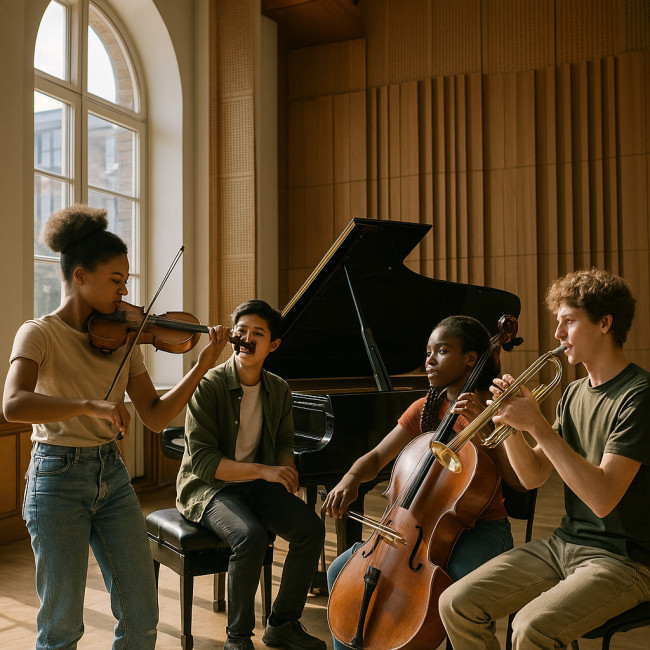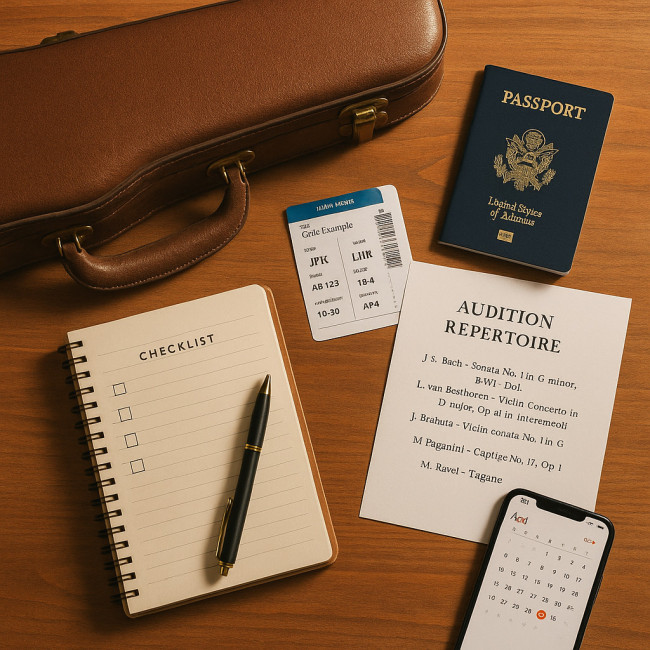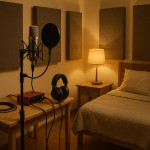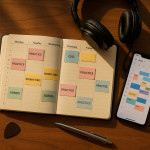Finding reputable music academies abroad: scholarships, visas and audition tips
Dreaming of polishing your artistry in Berlin, Boston or Beijing? This guide walks you through the complete journey: spotting world-class music academies, securing funding, clearing visa hurdles and nailing your auditions. You'll leave with an actionable checklist and insider resources to hit “apply” with confidence.
Why study music abroad?

Training overseas exposes you to new repertoires, master teachers and networking opportunities that can fast-track a global career. Many academies also connect students to international festivals and touring ensembles, expanding your résumé before graduation. Immersing yourself in a new cultural ecosystem also sharpens your adaptability, language skills and global mindset—qualities prized by orchestra managers, festival programmers and record labels seeking versatile talent.
How to evaluate a reputable academy
Check accreditation and ranking
Look for state or ministry recognition, plus memberships in associations such as the Association Européenne des Conservatoires (AEC) or the National Association of Schools of Music (NASM). Rankings aren't everything, yet consistent top-10 appearances indicate stable faculty quality and facilities.
Faculty track records
- Count recent competition wins by their students.
- Review faculty discographies and active orchestral posts.
- Attend online masterclasses to gauge teaching styles.
Performance opportunities
An academy that runs frequent concerts, studio classes and external gigs sharpens your stage craft. Some schools even provide credit for paid performances; combine that with smart rehearsal scheduling know-how to balance study and income.
Scholarship funding routes
Tuition abroad can climb above €40,000 a year, but a layered funding plan dramatically reduces the out-of-pocket cost.
| Funding source | Average amount (€/year) | Eligibility focus | Application window |
|---|---|---|---|
| Institutional merit awards | 5,000 – 20,000 | Audition score, GPA | Nov – Feb |
| Government bilateral grants | 8,000 – 25,000 | Citizenship + host country tie | Jan – Apr |
| Private foundations | 2,000 – 15,000 | Genre or instrument niche | Rolling |
| Corporate/art philanthropies | 3,000 – 18,000 | Diversity & community impact | Feb – May |
| On-campus assistantships | Partial tuition waiver + stipend | Advanced grad students | After admission |
Tips to strengthen your application
- Record a concise three-piece audition video with contrasting styles.
- Add press clippings or a link to your optimised portfolio on Artfolio musician training hub.
- Secure two reference letters that mention both artistry and community impact.
- Demonstrate commitment to practice routines—link to daily practice frameworks to show discipline.
Visa essentials for music students
Key documents
- Formal admission letter with programme duration.
- Proof of financial means (bank statement or scholarship letter).
- Health-insurance certificate recognised by host country.
- Clean criminal record (some EU nations require).
Typical timelines
Allow a minimum of 8–12 weeks from application to passport return. For high-volume embassies such as the United States or Canada, secure an appointment the moment you receive admission.
Work allowances while studying
Most study visas permit 15–20 hours of paid work per week. Gigging within school ensembles counts, so keep contracts and pay slips organised for renewals. Review local tax codes to avoid surprises.
Audition strategies that win seats and funding
Pre-screen round
Many top academies filter candidates through video submissions. Film in 1080 p, neutral background, and use two mics: one close and one ambient. A compelling thumbnail—similar to tactics in optimising singer listings—increases click-throughs by faculty reviewers.
Live audition day
- Arrive at least 90 minutes early to test acoustics and adjust reeds/strings.
- Carry printed repertoire list and piano scores for the staff accompanist.
- Mental reset: 4-7-8 breathing reduces cortisol and steadies vibrato.
- Plan a short personal introduction; committees appreciate context.
Interview component
Expect questions on your career vision and contribution to campus culture. Relate answers to future collaborations, for example attending producer meetups hosted by the academy's partners.
Cost-saving hacks once enrolled
Housing
Dorms are cheapest, yet local musicians often sublet practice-friendly flats. Join Facebook groups or the academy's housing board early.
Instrument insurance
International cover can halve replacement time. Bundle with health-insurance for discounts.
Side gigs
Campus event offices book student ensembles frequently. Build a flexible booking calendar that syncs with coursework and practice blocks.
Quick reference checklist
- 6–12 months out: shortlist academies, prepare repertoire, research scholarships.
- 4–6 months out: submit applications, record pre-screens, line up references.
- 3 months out: gather visa documents, schedule medicals, book flights.
- 1 month out: confirm housing, insure instrument, plan arrival rehearsal slots.
Quiz: Are you ready to apply abroad?
FAQ
- Can I apply to multiple academies in the same country?
- Yes. Submit separate applications but reuse video material when criteria match. Only tailor the personal statements.
- Do language tests matter for music programmes?
- Most conservatoires require B2–C1 in the teaching language for academic courses, although performance majors sometimes waive scores if lessons are one-to-one.
- Is private health-insurance mandatory?
- Many EU nations allow public student insurance, yet faster instrument treatment (e.g., wrist strain therapy) often needs private coverage.
- What if my scholarship doesn't cover living costs?
- Combine smaller grants, teaching assistantships and paid gigs organised via the school's career office.
- How early should I book practice rooms after arrival?
- Reserve during enrolment week; prime evening slots disappear quickly once classes start.
Next steps

Download each academy's prospectus today, block practice time for audition pieces, and draft your scholarship essays. With structured preparation, you'll soon join the ranks of international artists shaping tomorrow's soundscape. Pack loose reeds, shoulder rests and spare strings in your carry-on, and keep digital copies of every document in cloud storage to safeguard against last-minute mishaps during transit.
Ready to start? Apply your new knowledge and begin shortlisting schools now.











